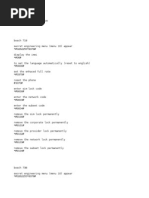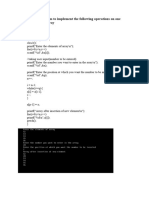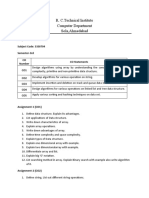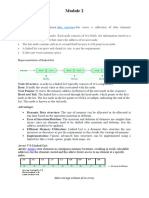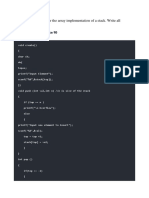Doubly Linked List Program in C
Uploaded by
Abhi KaleDoubly Linked List Program in C
Uploaded by
Abhi KaleDOUBLY LINKED LIST PROGRAM IN C
http://www.tutorialspoint.com/data_structures_algorithms/doubly_linked_list_program_in_c.htm
Copyright © tutorialspoint.com
Doubly Linked List is a variation of Linked list in which navigation is possible in both ways either
forward and backward easily as compared to Single Linked List.
Implementation in C
#include <stdio.h>
#include <string.h>
#include <stdlib.h>
#include <stdbool.h>
struct node {
int data;
int key;
struct node *next;
struct node *prev;
};
//this link always point to first Link
struct node *head = NULL;
//this link always point to last Link
struct node *last = NULL;
struct node *current = NULL;
//is list empty
bool isEmpty(){
return head == NULL;
}
int length(){
int length = 0;
struct node *current;
for(current = head; current != NULL; current = current->next){
length++;
}
return length;
}
//display the list in from first to last
void displayForward(){
//start from the beginning
struct node *ptr = head;
//navigate till the end of the list
printf("\n[ ");
while(ptr != NULL){
printf("(%d,%d) ",ptr->key,ptr->data);
ptr = ptr->next;
}
printf(" ]");
}
//display the list from last to first
void displayBackward(){
//start from the last
struct node *ptr = last;
//navigate till the start of the list
printf("\n[ ");
while(ptr != NULL){
//print data
printf("(%d,%d) ",ptr->key,ptr->data);
//move to next item
ptr = ptr ->prev;
printf(" ");
}
printf(" ]");
}
//insert link at the first location
void insertFirst(int key, int data){
//create a link
struct node *link = (struct node*) malloc(sizeof(struct node));
link->key = key;
link->data = data;
if(isEmpty()){
//make it the last link
last = link;
}else {
//update first prev link
head->prev = link;
}
//point it to old first link
link->next = head;
//point first to new first link
head = link;
}
//insert link at the last location
void insertLast(int key, int data){
//create a link
struct node *link = (struct node*) malloc(sizeof(struct node));
link->key = key;
link->data = data;
if(isEmpty()){
//make it the last link
last = link;
}else {
//make link a new last link
last->next = link;
//mark old last node as prev of new link
link->prev = last;
}
//point last to new last node
last = link;
}
//delete first item
struct node* deleteFirst(){
//save reference to first link
struct node *tempLink = head;
//if only one link
if(head->next == NULL){
last = NULL;
}else {
head->next->prev = NULL;
}
head = head->next;
//return the deleted link
return tempLink;
}
//delete link at the last location
struct node* deleteLast(){
//save reference to last link
struct node *tempLink = last;
//if only one link
if(head->next == NULL){
head = NULL;
}else {
last->prev->next = NULL;
}
last = last->prev;
//return the deleted link
return tempLink;
}
//delete a link with given key
struct node* delete(int key){
//start from the first link
struct node* current = head;
struct node* previous = NULL;
//if list is empty
if(head == NULL){
return NULL;
}
//navigate through list
while(current->key != key){
//if it is last node
if(current->next == NULL){
return NULL;
}else {
//store reference to current link
previous = current;
//move to next link
current = current->next;
}
}
//found a match, update the link
if(current == head) {
//change first to point to next link
head = head->next;
}else {
//bypass the current link
current->prev->next = current->next;
}
if(current == last){
//change last to point to prev link
last = current->prev;
}else {
current->next->prev = current->prev;
}
return current;
}
bool insertAfter(int key, int newKey, int data){
//start from the first link
struct node *current = head;
//if list is empty
if(head == NULL){
return false;
}
//navigate through list
while(current->key != key){
//if it is last node
if(current->next == NULL){
return false;
}else {
//move to next link
current = current->next;
}
}
//create a link
struct node *newLink = (struct node*) malloc(sizeof(struct node));
newLink->key = key;
newLink->data = data;
if(current == last) {
newLink->next = NULL;
last = newLink;
}else {
newLink->next = current->next;
current->next->prev = newLink;
}
newLink->prev = current;
current->next = newLink;
return true;
}
main() {
insertFirst(1,10);
insertFirst(2,20);
insertFirst(3,30);
insertFirst(4,1);
insertFirst(5,40);
insertFirst(6,56);
printf("\nList (First to Last): ");
displayForward();
printf("\n");
printf("\nList (Last to first): ");
displayBackward();
printf("\nList , after deleting first record: ");
deleteFirst();
displayForward();
printf("\nList , after deleting last record: ");
deleteLast();
displayForward();
printf("\nList , insert after key(4) : ");
insertAfter(4,7, 13);
displayForward();
printf("\nList , after delete key(4) : ");
delete(4);
displayForward();
}
If we compile and run the above program then it would produce following result −
Output
List (First to Last):
[ (6,56) (5,40) (4,1) (3,30) (2,20) (1,10) ]
List (Last to first):
[ (1,10) (2,20) (3,30) (4,1) (5,40) (6,56) ]
List , after deleting first record:
[ (5,40) (4,1) (3,30) (2,20) (1,10) ]
List , after deleting last record:
[ (5,40) (4,1) (3,30) (2,20) ]
List , insert after key(4) :
[ (5,40) (4,1) (4,13) (3,30) (2,20) ]
List , after delete key(4) :
[ (5,40) (4,13) (3,30) (2,20) ]
You might also like
- The C# Player's Guide - 5th Edition - 5.0.083% (18)The C# Player's Guide - 5th Edition - 5.0.0497 pages
- Introduction To Computer Theory by Cohen Solutions Manual80% (5)Introduction To Computer Theory by Cohen Solutions Manual198 pages
- Ap Computer Science Principles Practice Exam and Notes 202186% (7)Ap Computer Science Principles Practice Exam and Notes 2021108 pages
- Hacking The Art of Exploitation 2nd Edition Jon Erickson100% (20)Hacking The Art of Exploitation 2nd Edition Jon Erickson492 pages
- PrepTest 83 - Print and Take Test - 7sage Lsat100% (3)PrepTest 83 - Print and Take Test - 7sage Lsat46 pages
- Structures and Unions in C: Slides Taken From: Alan L. Cox Computer Science Department Rice University Texas100% (2)Structures and Unions in C: Slides Taken From: Alan L. Cox Computer Science Department Rice University Texas11 pages
- SORTING (Bubble Sort) Aim of The Experiment: Write A C Program That Implement Bubble Sort Method To Sort A GivenNo ratings yetSORTING (Bubble Sort) Aim of The Experiment: Write A C Program That Implement Bubble Sort Method To Sort A Given12 pages
- EE 2204 - Data Structures and Algorithms: N Radhakrishnan Assistant Professor Anna University, ChennaiNo ratings yetEE 2204 - Data Structures and Algorithms: N Radhakrishnan Assistant Professor Anna University, Chennai83 pages
- 1-Write A Program To Implement The Following Operations On One Dimensional Array A) InsertionNo ratings yet1-Write A Program To Implement The Following Operations On One Dimensional Array A) Insertion19 pages
- R. C.Technical Institute Computer Department Sola, AhmedabadNo ratings yetR. C.Technical Institute Computer Department Sola, Ahmedabad3 pages
- Programming and Data Structures: Debasis SamantaNo ratings yetProgramming and Data Structures: Debasis Samanta63 pages
- Implementation of Queue Data Structure Using Array: 20CS2013 L-Data Structures and Algorithms LabNo ratings yetImplementation of Queue Data Structure Using Array: 20CS2013 L-Data Structures and Algorithms Lab3 pages
- Lab-manual-Advanced Python Programming 4321602No ratings yetLab-manual-Advanced Python Programming 432160224 pages
- Addition of Two Polynomials Using Linked ListNo ratings yetAddition of Two Polynomials Using Linked List15 pages
- Ad3311 - Artificial Intelligence Lab ManualNo ratings yetAd3311 - Artificial Intelligence Lab Manual30 pages
- Data Structure Calicut University 2nd SemNo ratings yetData Structure Calicut University 2nd Sem20 pages
- Chapter 11 - Templates: 2003 Prentice Hall, Inc. All Rights ReservedNo ratings yetChapter 11 - Templates: 2003 Prentice Hall, Inc. All Rights Reserved26 pages
- Data Structure Unit 2 Important QuestionsNo ratings yetData Structure Unit 2 Important Questions48 pages
- Spring End Sem Data Structure Question 2012-13No ratings yetSpring End Sem Data Structure Question 2012-132 pages
- Data Structures and Algorithms ProblemsNo ratings yetData Structures and Algorithms Problems20 pages
- Coding With JavaScript For Dummies Everything To Know About JavaScript (2020) - 40153100% (1)Coding With JavaScript For Dummies Everything To Know About JavaScript (2020) - 40153247 pages
- NWO, Illuminati, Freemason, Occult, Bible Prophecy, Conspiracy, Secret Society, Etc. LinksNo ratings yetNWO, Illuminati, Freemason, Occult, Bible Prophecy, Conspiracy, Secret Society, Etc. Links47 pages
- Structured and Unstructured Maintenance With Example0% (1)Structured and Unstructured Maintenance With Example9 pages
- Learn To Code HTML and CSS Develop Style Websites PDF100% (2)Learn To Code HTML and CSS Develop Style Websites PDF595 pages
- Python Programming For Beginners - A Crash Course To Learn Python and Other Recommended Coding83% (6)Python Programming For Beginners - A Crash Course To Learn Python and Other Recommended Coding86 pages
- LINUX COMMAND LINE An Introduction To Linux Command Line EnvironmentNo ratings yetLINUX COMMAND LINE An Introduction To Linux Command Line Environment174 pages
- How To Use PATS Module Initialization FunctionNo ratings yetHow To Use PATS Module Initialization Function5 pages
- (AN683) Strain Gauge Measurement Using AC ExcitationNo ratings yet(AN683) Strain Gauge Measurement Using AC Excitation1 page
- Linkedin Contact: 713.784.3870: Joe McdonaldNo ratings yetLinkedin Contact: 713.784.3870: Joe Mcdonald5 pages
- 1999 Singh Pressure Chuteless Toothed Roller Feeding SystemNo ratings yet1999 Singh Pressure Chuteless Toothed Roller Feeding System9 pages








